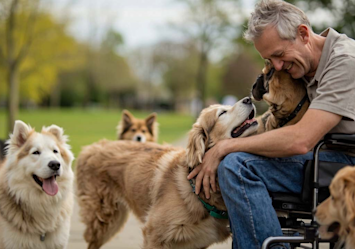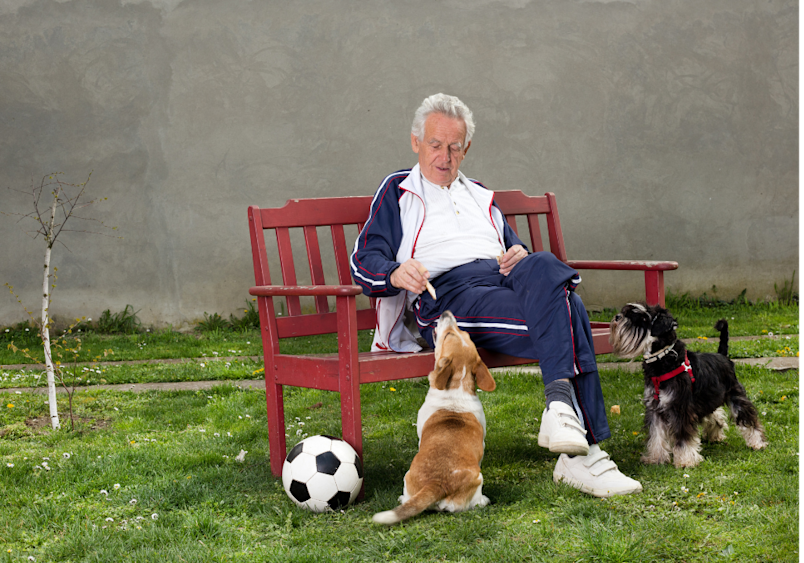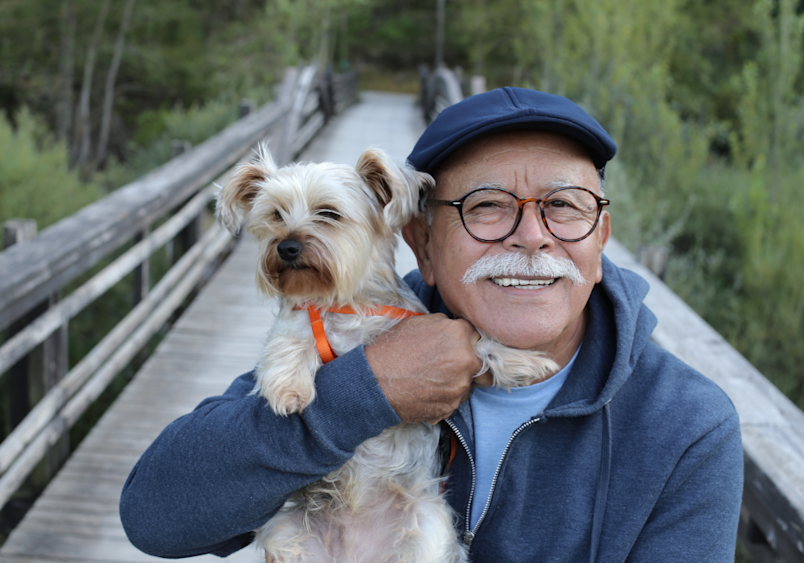
If a doctor could prescribe a pill that lowered blood pressure, cholesterol, and triglycerides, slashed the risk of disabling dementia by 40%, and increased physical activity by nearly 300%, everyone would take it. Well, that 'pill' has four legs and a wagging tail.
When it comes to pets for seniors, the benefits may be even greater than for the general population. Not only can they help boost your health and wellness, but you’ll likely have more time to devote to a dog, boosting their wellness too! However, it can be a bit tricky finding the right dog that’s not too much work, isn’t a tripping hazard, and that won’t be begging for a walk all of the time.
The best dog breeds for seniors are those that are low-maintenance, smaller, friendly, and have manageable health issues. Sound too good to be true? Don’t worry, we’re here to show you some of the best low-maintenance and small dog breeds for seniors.
Why Dogs Make Perfect Companions for Seniors
As we enter retirement and our golden years, most of us have more time on our hands. Without a regular job to go to, we also may start losing our sense of purpose, lose touch with friends, and experience loneliness. That’s where a dog comes in.
Dogs provide companionship and responsibility that can help boost mental health and ward off loneliness. They also require exercise which gets us up and moving, boosting mood and physical health as they go. Dogs can even increase a person’s social circle by getting us to the dog park, veterinarian’s office, pet store, etc. where other likeminded individuals can be found.
One major bonus about having a dog in your senior years is you likely have more time to spend with your dog with fewer time constraints due to employment.
What Makes the Best Dog for Seniors?
When choosing a dog for your senior lifestyle, you’ll want to take into account some different factors than you didn’t have to when choosing your first puppy as a kid. Those may include:
Size Considerations
If you’ve downsized your home, you’ll likely want to downsize your dog. Most larger breeds need lots of space, something that an apartment or townhouse may not be able to provide. You don’t want you or your dog to feel cramped, so consider your housing size when choosing a dog size.
Energy Level Considerations
Some seniors are highly active and don’t skip a physical beat, but for most of us, older age means slowing down a bit. You don’t want a dog that’s go, go, go, when you’d like a little down time or have mobility issues. Instead of an all-day hiker kind of dog, one that’s a little lower energy may be best.
Grooming and Maintenance
Dogs come in a variety of coat lengths, textures, and thicknesses, all of which have their own special needs when it comes to grooming. If you don’t have the ability to do daily brushing or frequent trimming or if it’s difficult to get to a groomer regularly, consider a short-haired breed that requires little grooming maintenance.
Temperament Considerations
This dog is meant to be your companion, your friend, your company, so you’ll want to choose a dog’s that’s friendly, affectionate, and loyal. Some may prefer a small lap dog that wants nothing more than to cuddle, while others may want a larger sidekick that is equally affectionate, just not a lap sitter.
Health and Lifespan Considerations
Chronic health issues occur in dogs as well, and for most seniors, the constant veterinary visits, caretaking, or medication giving can be difficult. Selecting a healthy dog is optimal to keep healthcare maintenance low.
Best Dog Breeds for Seniors by Category

With the above considerations in mind, let’s look at some of the best dog breeds for seniors.
Best Small Dogs (Under 20 lbs)
Small dogs may be advantageous depending on your living situation, and most have a lower activity level. They also tend to make better snuggly lap dogs, if that’s what you’re looking for. Cavalier King Charles Spaniels, Maltese, and Bichon Frise are great options for loving, small dogs that require minimal exercise, but some do need more in-depth grooming.
Best Low-Maintenance Dogs
Low maintenance means minimal exercise and minimal grooming. French Bulldogs and Boston Terriers are great examples of dogs that don’t take a lot of input but give a lot of affection and companionship.
Best Medium Dogs (20-35 lbs)
For more active seniors that want an exercise companion, a medium sized breed like the Cocker Spaniel, Beagle, or Basset Hound may be good options. These dogs will do well on longer walks but don’t require constant mental or physical stimulation.
Not Best Dog Breeds for Seniors
As a senior, you still have quite a few options for good dog breeds, but not every one may be the best choice.
High-Energy Breeds
Some dogs require a lot of exercise to keep both their minds and their bodies busy. Otherwise, they may resort to destructive behaviors. High-energy breeds to avoid would be Border Collies, Australian Shepherds, and most other herding or working breeds.
Large, Strong Breeds
You also don’t want a large, strong kind of dog that’s capable of pulling you around. This can endanger both you and the dog. Rottweilers, Great Danes, and German Shepherds may be a little too strong and pushy for most seniors to enjoy.
High-Maintenance Breeds
Dogs with thick, long haircoats require a lot of grooming to prevent mats and tangles, which is something you may not want to take part in as a senior. Avoid dogs like Afghan Hounds and Chow Chows for this reason. You also may want to avoid dog breeds that are classically more difficult to train, such as Akitas or Shiba Inus, because who wants to spend their golden years repeatedly working on dog manners?
Where to Find Dogs for Seniors
Now that you have an idea of what dog breeds may work best for a senior lifestyle, let’s look at where to find them. Start by talking to your veterinarian if you have one. They may know reputable breeders or rescues if you have a specific breed in mind.
Otherwise, look into a senior-to-senior adoption program, such as Pet Helper, that pairs senior humans with senior dogs.
If you want to go the shelter route, have some questions ready. Be specific about your living situation, mobility issues, and what you want from a dog companion so that they can provide the best match possible.
Physical and Financial Readiness for Seniors Owning Dogs
Getting a dog is a big decision, and it should be well thought out beforehand. Plan for any modifications you may need for your home, such as installing a doggie door for easier outside access or where you’re going to put their bed so that it’s not a tripping hazard. If you have mobility issues, make sure you have someone lined up that can exercise your pup. Consider purchasing a crate so you can safely confine your dog at times if needed and have all other supplies on hand before bringing your dog home.
Costs for Dogs for Seniors
As far as finances, dogs can be a bit pricey both in the initial purchase or adoption and in daily expenses. Ensure you can cover food and supplies on your fixed income and be sure to get insurance for dogs to cover unexpected veterinary medical expenses, which can jump into the thousands very quickly.
Also consider adding a wellness plan for dogs to help budget for preventatives like vaccinations, flea and tick medications, and even grooming expenses.
Best Dogs for Seniors

Not only do dogs make great companions for seniors, they can also help them live a healthier life. However, not every dog breed is well suited for senior living, so when choosing your furry companion, consider the dog’s size, energy level, temperament, grooming, and training requirements. Speak to a veterinarian, shelter, or pet organization if you need help choosing the perfect companion for your golden years. If a dog is the ultimate pill for aging well, then choosing the right breed is simply making sure you have the perfect dosage for your lifestyle.